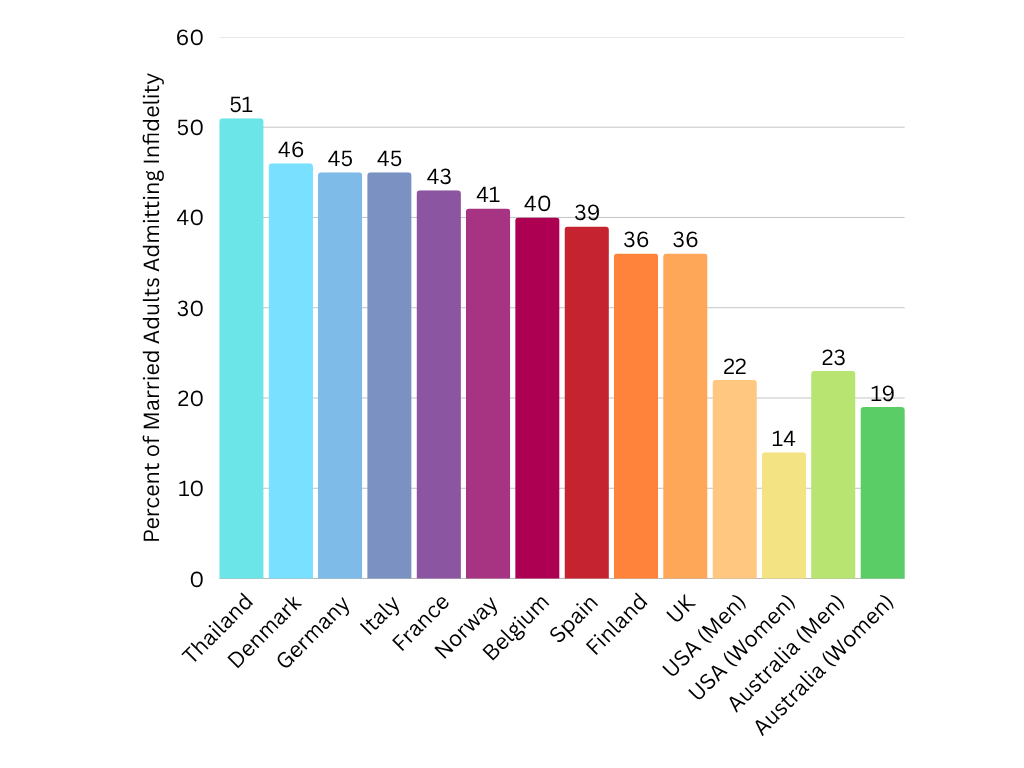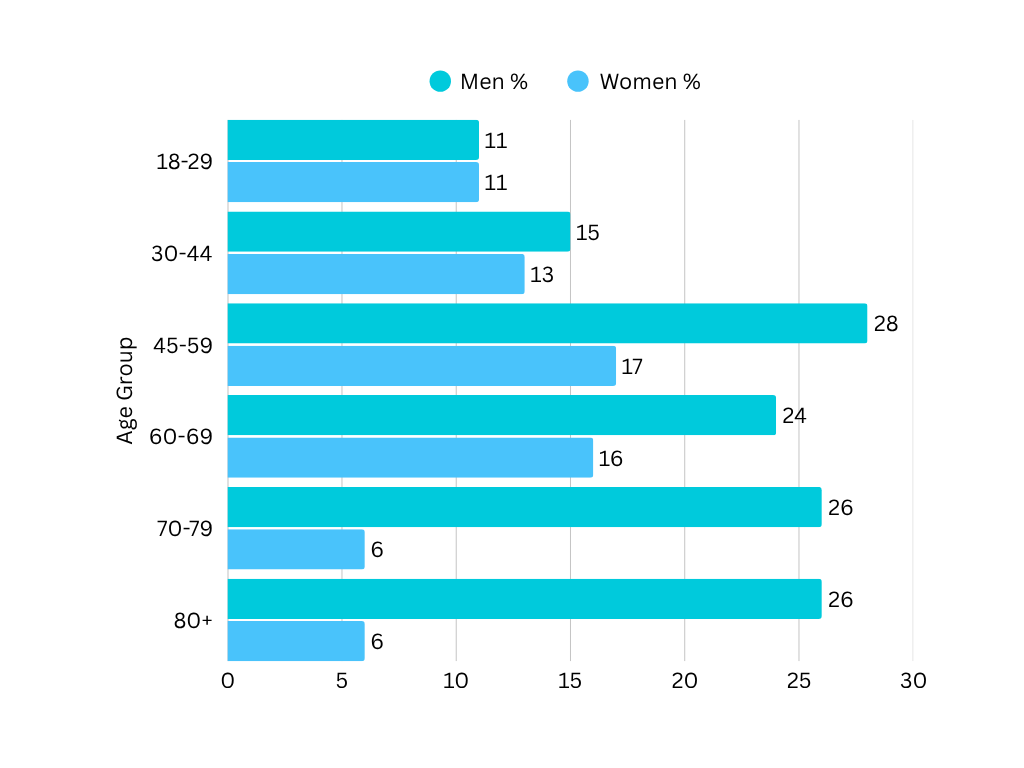
The Truth on Cheating: Gender, Country and Age

Uncover the surprising truth about infidelity. Our deep dive reveals who cheats more based on gender, country, and age.
Cheating is one of those topics everyone whispers about but rarely confronts head-on. It’s uncomfortable, controversial, and incredibly common. But the deeper question isn’t just who’s doing it, it’s why, how, and what signs give them away?
Let’s drop the tabloid drama and get brutally honest. This post dives into hard stats, real-world psychology, and human patterns from three of the most culturally revealing countries in the English-speaking world: the UK, the US, and Australia.
Global numbers don’t lie
In 2025, cheating is more common than most want to admit. Globally, Thailand tops the charts with over 50% of married adults admitting infidelity. European countries like Denmark, Germany, and Italy hover around 45%. And the so-called faithful Western bloc? It’s not far behind.
In the United States, up to 71% of people have considered cheating in some form. For married couples specifically, about 20–25% of men and 13–15% of women admit to physical infidelity. Emotional affairs are harder to track, but their numbers are skyrocketing, especially among women. In Australia, roughly 23% of men and 19% of women in relationships have strayed. The UK is right in the middle, with about 36% of married adults owning up to affairs.
But if you think these are just numbers, you’re missing the plot. Because behind every stat is a pattern, and every pattern tells a story.

Men vs women: who cheats more, really?
In raw numbers, men still lead the infidelity race. But not by much. In the younger age groups (18–29), some studies show women slightly outpacing men in cheating behavior. The real divergence shows up in midlife, ages 45 to 59, where men clock in at around 28% cheating rates, compared to women’s 17%. After 60, men keep going. Women tend to slow down.
So, what’s going on?
The motive differs. Men often cheat for novelty, unmet sexual needs, or ego reinforcement. For women, it’s usually about emotional neglect, validation, or disconnection. When a woman cheats, she’s typically already checked out emotionally. When a man cheats, he may still love his partner but feels unappreciated or stagnant.
This is where modern relationship culture complicates things. Digital temptation is everywhere. Exes lurking on Instagram. Work flirtations blurring boundaries. Dating apps turned into escapism. It’s not just about slipping into someone’s bed anymore, it’s about mental escape, fantasy, and dopamine hits.
What age group cheats the most?
Midlife is ground zero. For men, 50–59 is the danger zone. This age often brings career pressure, aging fears, and performance anxiety. Combine that with the monotony of long-term relationships, and the idea of “just one spark” becomes irresistible.
For women, peak cheating tends to land in their late 30s to early 50s. These are often years marked by unspoken resentment, unmet needs, and a growing hunger for appreciation.
Interestingly, the gender gap is almost non-existent in younger adults. In fact, some U.S. and Australian data suggest women under 30 cheat at slightly higher rates than men. The likely reason? They’ve grown up in a hyper-connected world, emotionally neglected by male partners raised without emotional literacy, and culturally encouraged to seek validation online.

Signs someone might be cheating
Now, let’s get into the meat. People rarely confess to cheating unless they’re caught. But behavior tells on them every time. Here’s what shifts when someone’s getting their needs met elsewhere, emotionally or physically.
The phone becomes a private vault. Flipped upside-down. On silent. Passwords changed. New apps. Vanishing call logs. Suddenly, that little rectangle is a fortress.
They start grooming with more intention. New gym habits, upgraded wardrobe, fragrance experiments. If they weren’t into cologne before and now they smell like a high-end department store, your radar should ping.
Schedules shift. More late nights. New meetings. Sudden work travel. They might say they’re “finding themselves” or “need space,” but their attention is clearly going somewhere else.
Emotionally, they pull back. Less sex, less eye contact, less empathy. Or, weirdly, they may overcompensate, gifts, fake sweetness, sudden affection. Guilt is a hell of a motivator.
You’ll hear more defensiveness, less transparency. Questions get brushed off. They accuse you of being controlling. They stop including you in their daily narrative.
One of the most powerful signals? Gut instinct. If something feels off for a sustained period, and their behavior patterns change in clusters, not just one-off mood swings, you’re not paranoid. You’re likely onto something.
Why do people cheat?
Cheating isn’t always about sex. Sometimes it’s about attention. Sometimes it’s about feeling powerful again. Or alive. Or wanted. It’s rarely just the existence of a better option, it’s usually the absence of connection at home.
For men, cheating often stems from sexual frustration, lack of novelty, or ego wounds. A man who’s chronically emasculated or overlooked in his relationship will often look for respect elsewhere. It’s less about love and more about being seen.
For women, it’s usually a slow-burn emotional disconnect. She’s been telling you she’s unhappy for months. You just didn’t listen. So when someone shows up who listens, game over.
In both cases, poor communication, lack of boundaries, and unresolved trauma set the stage. Add digital temptation, anonymity, and declining relationship skills, and it’s a perfect storm.
What the UK, US, and Australia reveal about modern relationships
Let’s zoom in.
In the UK, affairs often fly under the radar thanks to a culture of stoicism and privacy. People cheat quietly, often emotionally first. Office affairs are common, and apps that encourage cheating thrive. The stigma exists, but it’s subtle. Brits just don’t talk about it—until it implodes.
In the US, cheating has become both normalized and commercialized. From TV dramas to Instagram influencers, infidelity is sold as entertainment. The U.S. also leads in divorce-triggered affairs. When marriages crumble, it’s usually not sudden. It’s a slow emotional decay that ends with someone outside the home providing oxygen.
In Australia, the landscape is more blended. Emotional and physical affairs are nearly equal, and cheating often starts online. Privacy laws and digital independence make it easier to cheat without getting caught. But when the truth drops, it hits hard. Australians tend to be loyal until they’re not, and when they’re done, they’re all the way out.
What do you do if you suspect cheating?
Don’t go full spy mode. That just burns energy and makes you spiral. Observe. Track patterns. Strengthen your frame. The worst thing you can do is become insecure and needy, that just pushes them further away, cheating or not.
Ask clear, calm questions. “Is there someone else?” isn’t weak, it’s direct. Their reaction will tell you everything. If they deflect, blame-shift, or get hostile, they’re hiding something. If they admit they’re struggling and want to reconnect, there might be hope.
Cheating isn’t always the end. But it’s always a reckoning. Whether you rebuild or walk away, the real work starts with self-respect.
Cheating exposes who we really are
Infidelity isn’t just about broken promises. It’s a symptom. Of disconnection. Of silence. Of mismatched needs. Of ignored emotions. If your partner cheated, it doesn’t automatically mean they’re evil. And if you’ve cheated, it doesn’t mean you’re broken.
But it does mean something wasn’t working. And that something needs to be faced, not buried.
Because every affair has a before. A series of moments where honesty could’ve changed the outcome. And every recovery, whether solo or together, starts when one person finally says, “Enough. I want real connection again.”
Don’t just chase loyalty. Build attraction. Respect. Curiosity. And above all, honesty.
That’s how you bulletproof love in the age of temptation.



























